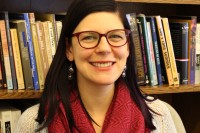Reading Paul without anti-Judaism (2 Corinthians 3:12-4:2)
It’d be easier to ignore the tough parts of this 2 Corinthians text. But that’s dangerous.
To receive these posts by email each Monday, sign up.
For more commentary on this week's readings, see the Reflections on the Lectionary page. For full-text access to all articles, subscribe to the Century.
We are changed “from glory to glory,” says the King James Version. The 2 Corinthians reading itself moves from cringey to comforting. For Christians striving to remove anti-Judaism from our biblical interpretation and preaching, the first half presents a challenge.
It’d be easy enough to focus on one of the other texts assigned for Transfiguration Sunday. Or to skip to verse 17, where the beautiful part begins, and to focus on how we are transformed by moments of encountering God. But doing that while ignoring the tough parts of this text is dangerous.
Removing Anti-Judaism from the Pulpit includes essays from scholars and pastors, along with sermons with commentary. It was published in 1996, around the time I began listening more carefully to sermons. In the three decades since, I haven’t seen much shift from what Martin E. Marty observes in the book: that when lectionary assignments are read in church, they tend to come with “few expositions of the anti-Jewish references in the texts,” at least not of the sort that might help the congregation relate to Jewish people and Judaism today.
Here are a few of the lessons from that book that are valuable in preaching this text:
- Emphasize that the “old covenant” has not been revoked or superseded. In a culture that values newness as good in and of itself, most of us need the reminder that old does not mean obsolete or defunct. It’s necessary to be unambiguous that God’s covenant with the Jews was expanded to include the Gentiles, not superseded to exclude the Jewish people.
- Be sure to describe Paul’s view of the law with appropriate nuance. Recognizing that Paul’s rhetoric in this passage is part of a debate around whether Gentile converts to Christianity needed to observe Torah, it’s important to be clear that Paul’s contrast of freedom or grace with the law does not mean the denigration of Jewish Torah observance. John T. Pawlikowski, OSM, a leader in Catholic-Jewish relations, writes, “No faithful Jew would in fact challenge” Paul’s conviction “that ultimately it is God’s righteousness through which we are saved.” Pawlikowski notes that some scholars think it likely that Paul approved of Jewish Christians continuing to observe Torah, and even of Gentile Christians freely adopting such practice—as long as none of them thought it was saving them.
- Remember that Paul is speaking to Gentiles new to the biblical faith. A Will Willimon sermon in the book takes its text from Romans but applies to 2 Corinthians as well: it poses the question of just how the good news of the Jewish Jesus, addressed to his own people, is good news for the rest of the world. “For Paul,” says Willimon, “the ultimate wonder of Christ, the deepest marvel of the coming of Jesus, was not the virgin birth, or angels in the skies, but the gracious inclusion even of Gentiles into the promises of God to Israel.” That sense of wonder or marvel changes the tone in reading Paul’s description of the events of Exodus, where the spiritual ancestors of the Gentiles were not present—yet they too, through Christ’s Spirit, can see the glory of the Lord. Paul connects the history of Moses with the “Greco-Roman belief that an encounter with the divine transforms the beholder” into the deity’s image, as The Jewish Annotated New Testament notes.
Taking all of this to heart can change our perspective and—as another of the book’s authors, Carol Ann Morrow, summarizes contemporary scholarship—allow us to see “a Paul who was proud of his own Jewishness, who responded pragmatically to problem situations but who continued to observe the Torah himself.” That view is something that can help our congregations to place their texts in a fuller, more-accurate context. And it can help build and strengthen relationships with Jewish communities today.






